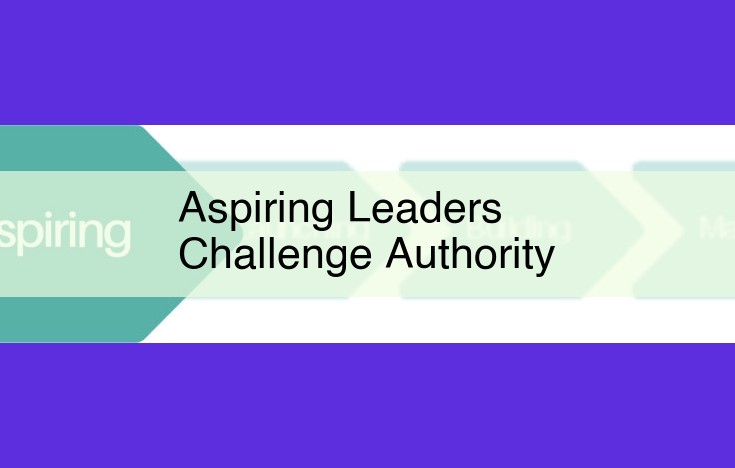Aspiring leaders challenge authority to cultivate critical thinking and curiosity, fostering innovation and dissent within organizations. By questioning the established order, these leaders demonstrate independent thinking and unconventional ideas, driving the desire for improvement. Harnessing the principles of authority challenge empowers them to effectively navigate risks and embrace a leadership mindset, maximizing their impact and contributing to organizational success.
Challenging Authority: A Cornerstone for Aspiring Leaders
In the ever-evolving landscape of leadership, challenging authority has emerged as a pivotal cornerstone for aspiring leaders. It’s not about rebelling against hierarchy, but rather a calculated and respectful questioning of established norms and practices. By embracing this concept, aspiring leaders can foster critical thinking, spark innovation, and cultivate a culture of dissent that drives organizational growth.
Challenging authority, in its essence, involves questioning the status quo, evaluating information critically, and proposing alternative solutions. It’s not about blind opposition, but rather a reasoned and informed exploration of established thinking. Leaders who possess the courage to challenge authority are often independent thinkers, skeptical of assumptions, and driven by an insatiable curiosity to seek improvement.
Critical thinking plays a crucial role in the process of challenging authority. It empowers individuals to analyze information objectively, identify biases, and formulate sound judgments. By questioning assumptions, skepticism, and unconventional thinking, leaders can break free from the confines of traditional wisdom and explore new possibilities.
Curiosity, the spark for innovation, fuels the desire to challenge authority. Aspiring leaders who are inquisitive, open to new ideas, and willing to explore uncharted territories are more likely to identify areas for improvement and propose innovative solutions. By embracing curiosity, leaders can foster a culture of continuous learning and growth within their organizations.
Creating a supportive environment where individuals feel comfortable challenging authority is critical for its success. This requires fostering psychological safety, where individuals feel respected and valued for their contributions, regardless of their position or level of authority. Encouraging open dialogue, active listening, and respectful debates can create a fertile ground for constructive dissent.
History is replete with examples of successful authority challenges that have led to organizational transformations. From Martin Luther’s challenge to the Catholic Church to Rosa Parks’ defiance of the segregation laws, challenging authority has played a pivotal role in shaping the course of history. Aspiring leaders can learn from these examples and develop the skills and qualities necessary to effectively challenge authority and drive positive change.
However, it’s important to approach authority challenges with respect and strategy. Blindly opposing authority can lead to conflict and damage relationships. Aspiring leaders should choose their battles wisely, gather evidence to support their claims, and communicate their challenges in a respectful and persuasive manner.
Challenging authority is not without its risks. Aspiring leaders may face resistance, criticism, or even retaliation. However, the potential benefits far outweigh the risks. By embracing the principles of challenging authority, aspiring leaders can develop their leadership mindset, build a culture of innovation, and empower themselves to make a meaningful impact within their organizations and beyond.
Critical Thinking: A Catalyst for Questioning Authority
Introduction:
* Begin with an anecdote or real-world example that highlights the significance of critical thinking in challenging authority.
* Introduce the concept of critical thinking and its role in questioning established norms and assumptions.
Understanding Critical Thinking:
* Define critical thinking as the ability to analyze information, identify biases, and draw sound conclusions.
* Discuss the key components of critical thinking, such as questioning, skepticism, and unconventional thinking.
Challenging Authority with Critical Thinking:
* Explain how critical thinking empowers individuals to examine authority objectively and identify potential flaws or biases.
* Provide examples of how critical thinking can lead to constructive criticism and promote innovation.
Benefits of Questioning Authority:
* Highlight the benefits of encouraging a culture of dissent within organizations, including increased creativity, improved decision-making, and reduced groupthink.
* Emphasize that questioning authority does not equate to disrespect but rather to a healthy desire for improvement.
Developing Critical Thinking Skills:
* Offer tips and techniques for developing critical thinking abilities, such as:
* Asking insightful questions
* Evaluating evidence objectively
* Considering multiple perspectives
Conclusion:
* Summarize the key points about the role of critical thinking in challenging authority.
* Encourage readers to cultivate their critical thinking skills and embrace the principles of questioning authority for personal and organizational growth.
* Provide a call to action for readers to apply these principles in their own lives and contribute to a culture of innovation and progress.
Curiosity: The Spark for Innovation
In the realm of leadership and organizational growth, curiosity plays a pivotal role. It’s the driving force behind challenging authority and the catalyst for innovation.
Curiosity is a natural disposition that prompts us to explore, question, and seek deeper understanding. It’s an insatiable thirst for knowledge and a willingness to venture beyond familiar territory. For aspiring leaders, cultivating curiosity is essential for fostering a mindset that embraces growth, innovation, and challenge.
Curiosity ignites the desire to challenge authority because it questions established norms and assumptions. When we’re curious, we’re not content with accepting the status quo. Instead, we delve deeper, explore alternative perspectives, and seek improvement. Curiosity emboldens us to question authority figures, not out of disrespect, but out of a genuine desire to uncover truth and achieve better outcomes.
Related concepts, such as independent thinking and unconventional thinking, are closely interwoven with curiosity. Independent thinking allows us to formulate our own opinions, based on critical analysis and rational judgment. Unconventional thinking challenges accepted norms and seeks creative solutions. Both of these qualities are essential for effective leadership.
By embracing curiosity, aspiring leaders cultivate a mindset that’s open to new ideas, questioning assumptions, and seeking continuous improvement. This mindset empowers them to challenge authority constructively, propose innovative solutions, and drive organizational success.
Cultivating a Culture of Dissent
Strategies for Fostering an Inclusive Environment
To cultivate a culture of dissent, leaders must create an environment where individuals feel safe and supported in expressing their perspectives. This involves establishing clear guidelines and expectations, promoting open communication, and demonstrating a willingness to listen to alternative viewpoints.
Psychological Safety and Open Communication
Psychological safety is paramount. Individuals need to know that they can speak their minds without fear of retribution. Leaders should actively encourage dialogue, promote respectful listening, and create opportunities for individuals to voice their opinions. Regularly scheduled team meetings, anonymous feedback channels, and mentorship programs can provide dedicated spaces for dissent.
Benefits of Dissent in Organizations
Fostering dissent can bring immense benefits to organizations. By encouraging diverse perspectives, leaders can identify blind spots, stimulate creativity, and drive innovation. Dissent challenges assumptions, leads to better decision-making, and fosters a culture of continuous improvement.
Leaders as Role Models
Leaders play a crucial role in modeling the behaviors they expect from their teams. By demonstrating open-mindedness, curiosity, and a willingness to consider alternative viewpoints, they create a culture where dissent is valued and respected. Leaders should also acknowledge and reward individuals who contribute constructive challenges and engage in respectful debate.
Examples of Effective Authority Challenges
Challenging authority can be a daunting prospect, especially in hierarchical organizations. However, when done respectfully and strategically, it can lead to groundbreaking results. Here are a few inspiring examples of successful authority challenges and the impact they had:
Case Study: Google’s “20% Time” Rule
Google’s renowned “20% Time” rule originated from an internal challenge to the traditional 9-to-5 workday. Two engineers, Marissa Mayer and Urs Hölzle, defied the established norms and proposed that employees should have 20% of their work week free to pursue their own projects. The result was a surge in innovation, with employees developing game-changing products like Gmail and Google Maps.
Skills and Qualities of Effective Challengers
Successful authority challengers often possess a unique combination of skills and qualities, including:
- Intellectual curiosity: A thirst for knowledge and a willingness to question assumptions.
- Critical thinking: The ability to analyze information objectively and identify flaws or inconsistencies.
- Communication skills: The ability to articulate ideas clearly and persuasively, both verbally and in writing.
- Respect and diplomacy: An understanding of the importance of approaching authority challenges with due deference and tact.
Impact of Authority Challenges
When authority is challenged effectively, the following positive outcomes can occur:
- Improved decision-making: Challenging authority forces leaders to carefully consider their decisions and seek out alternative perspectives.
- Increased innovation: Encouraging dissent creates a fertile ground for new ideas and solutions to emerge.
- Enhanced employee morale: Employees feel valued and respected when their opinions are heard and considered.
- Organizational growth: By challenging established ways of doing things, organizations can unlock their potential for continuous improvement and success.
The Pitfalls of Challenging Authority:
Questioning authority can be a double-edged sword. While it can foster innovation and improve organizational outcomes, it also carries potential risks that aspiring leaders must navigate skillfully.
One pitfall to avoid is approaching authority challenges disrespectfully or aggressively. This can create an adversarial atmosphere and make it less likely that your concerns will be heard. Instead, couch your challenges in a constructive and respectful manner, focusing on presenting your case with evidence and logic.
Another risk to consider is timing your authority challenges. Challenging an authority figure in a public forum or during a high-stakes meeting can backfire. Choose the right time and place to voice your concerns, when the other person is receptive and the stakes are lower.
Furthermore, be aware of the potential for retaliation. Challenging authority can make those in power uncomfortable and may lead to negative consequences. Be prepared to face resistance and potential pushback. Approach your challenges strategically and consider the potential costs and benefits before speaking out.
Remember that challenging authority should be done with the utmost respect for the person and their position. It is not about tearing others down but rather about seeking improvement and fostering a culture of open dialogue. By approaching these challenges thoughtfully and respectfully, you can mitigate the risks and reap the benefits of questioning authority to drive innovation and growth.
Building a Leadership Mindset: Embracing the Principles of Challenging Authority
True leadership is not about blindly following authority but embracing the courage to question, challenge, and drive innovation. Aspiring leaders must cultivate a mindset that embraces the principles of challenging authority in order to foster growth and success.
Challenging authority is not about disrespect or disregarding others’ opinions. Instead, it is about approaching conversations with an open mind, seeking to understand different perspectives, and critically evaluating information. By developing critical thinking skills, embracing curiosity, and cultivating a culture of dissent, aspiring leaders can effectively challenge authority in a respectful and strategic manner.
Reflect on your own experiences. Have you ever encountered a situation where you felt the need to challenge an authority figure? How did you approach the situation? What was the outcome? These moments provide valuable insights into your own leadership style and areas for improvement. By understanding your strengths and weaknesses, you can strategically identify opportunities to challenge authority effectively.
Challenging authority is not always easy. There may be risks involved, and it requires a level of confidence and courage. However, the potential rewards far outweigh any challenges. By fostering a leadership mindset that embraces the principles of challenging authority, you empower yourself to drive innovation, promote growth, and contribute to the success of your organization.




